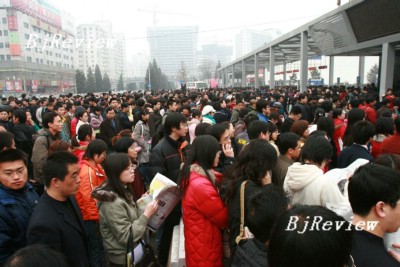|
Greetings on cellphones
Chinese mobile phone users went on a greeting spree during the Spring Festival, sending out a record-breaking 15 billion short messages over the seven-day holiday.
From February 17, Chinese Lunar New Year’s Eve, to February 23, an average of 33 short messages were sent from each mobile phone, according to figures from China Mobile and China Unicom, the country’s top two mobile operators.
The messaging craze brought mobile companies an estimated revenue of 1.5 billion yuan.
With China’s mobile users rocketing by more than 5.6 million on average in each month, text messaging has become an increasingly popular way of saying “happy new year” during the Spring Festival.
Coal control
The Chinese Government has halted handling new applications for coal prospecting rights to prevent investment in coal mining from overheating, according to the Ministry of Land and Resources.
The suspension lasts from February 2 this year to the end of 2008, when applications for selling prospecting rights through competitive channels like bidding will not be handled.
However, major coal exploration projects approved by the State Council, as well as surveys of coal resources with the support of special geological funds from the central and provincial governments, can continue to set up new prospecting rights.
Sources with the ministry said the move aims to prevent an oversupply of coal in the country and keep coal production stable.
China’s crude coal output reached 2.325 billion tons in 2006, up 8.1 percent year on year, according to the official statistics.
Sizzling steel
China’s iron and steel industry reaped a record profit of 169.95 billion yuan in 2006, rocketing more than 30 percent year on year, figures from the China Iron and Steel Industry Association show.
The whole industry scored 279.5 billion yuan in pre-tax profit in 2006, an increase of 23.95 percent over the previous year. A steel price hike, a product of the country’s decade-long economic boom, has lured astronomical funds into the industry.
Stimulated by robust market demand, China produced 418.78 million tons of crude steel in 2006, up 18.48 percent year on year and accounting for 33.79 percent of total global production.
The Chinese Government once adopted strict measures in 2004, including closing some local steel mills, to curb the surging investment in the industry.

Affordable housing
Vice Premier Zeng Peiyan has pledged to stabilize soaring property prices by putting up more real estate for sale, standardizing the market and offering more and better houses to low-income families.
Speaking at a recent State Council meeting on Beijing’s property market, Zeng said, “The Beijing municipal government should channel more funds into low-rent housing schemes and standardize the construction, sale and distribution of low-cost affordable houses.”
By the end of last year, 512 of the 657 cities had set up the low-rent housing scheme, and the Ministry of Construction ordered that it be extended to the rest of the country this year.
The Central Government has already taken measures to cool off the booming property market. They include an official mandate to build more small and medium-sized houses and strengthen land appreciation tax collection on developers.
Logistics professionals wanted
China is still lacking in logistics professionals despite the rapid expansion of its logistics industry and development of training for logistics professionals, according to a report by the Chinese Academy of Sciences (CAS).
It is difficult for both domestic and foreign-funded companies to find qualified logistics professionals in China, according to the report.
“Qualified professionals not only include senior managers engaged in management but also well-trained logistic workers,” Feng Gengzhong, a CAS researcher said.
In 2001, only one university in China offered a specialized course in logistics but by 2005 the number had grown to 165. Currently, the number of students choosing to take logistics majors is expanding.
However, the universities focus on academic studies and lack opportunities for practical experience, so students graduate with diplomas but without any real experience, the report said.
| 